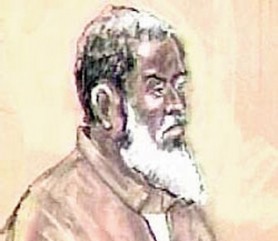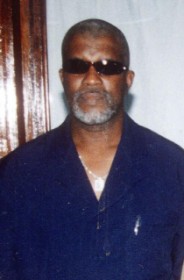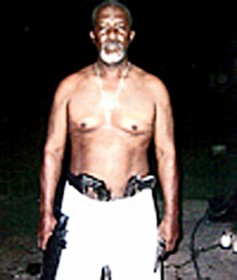Former PNCR parliamentarian Abdul Kadir and Guyanese-born Russell Defreitas now face the prospect of life imprisonment after a federal jury in Brooklyn, New York yesterday convicted them of planning to blow up the John F. Kennedy International Airport.

After deliberating for five days in a trial before Judge Dora L. Irizarry, the jury delivered the guilty verdict to the two men who showed no emotion as the decision was read, a report from the New York Times said. According to the report, Kadir and Defreitas were convicted on five counts of conspiring to commit acts of terrorism. Defreitas was also convicted of surveillance of an airport while Kadir was acquitted of this charge. The men are scheduled to be sentenced on December 15, but according to the New York Times, the lawyers for the two men have indicated they will appeal the decision.
The conviction of the duo is the first for Guyanese in a terror plot against the United States since 9/11 and is likely put this country under even greater scrutiny given Kadir’s prominence and his ties to Iran, security sources say. Prior to yesterday’s conviction Guyana had only been mentioned in connection with Adnan El-Shukrijumah, whose father is Guyanese and who US authorities had suspected of links to the 9/11 plotters. It was thought that El-Shukrijumah was the real target in the JFK bomb plot investigation.
A lawyer for Kadir expressed disappointed yesterday but not surprise at the verdict, a report from the New York Times said. The lawyer Kafahni Nkrumah reportedly said that the case had played on concerns about Muslims and terrorism which are particularly resonant in New York.
“There was more than just the evidence Mr. Kadir was up against,” Nkrumah, said. “There was the atmosphere of fear in the country,” the New York Times quoted the lawyer as saying.
Kadir, 58, served as a PNCR MP in the eighth Parliament of Guyana from 2002-2006. He is also a former mayor of Linden. He was arrested in June 2007 on a plane in Trinidad on his way to Iran. The 67-year-old Defreitas, is a United States citizen, and was once employed as a cargo handler at the JFK airport. Two other men, Abdel Nur and Donald Nero, have pleaded guilty to participating in the plot, while another Kareem Ibrahim is still awaiting trial. The plot to blow up the airport was hatched in January 2006, and reportedly involved blowing up jet fuel tanks leading to the airport.
The trial of Kadir and Defreitas began on June 30 and interest grew over time as to which of the two defendants presented the greater threat, the New York Times reported. While Defreitas had been the focus of the prosecutors’ opening arguments, by the closing arguments, Kadir’s name was mentioned nearly as often.

Kadir’s decision to testify in his defence caused his profile to grow. Once on the stand, the prosecution confronted him with evidence of his ties to Iran. The evidence included letters Kadir wrote to the Iranian ambassador to Venezuela and to the Iranian diplomat who has been accused of leading a major terrorist plot in South America, the New York Times reported.
While on the stand, Kadir denied an accusation by the US that he spent years secretly working as a spy for Iran, during which he allegedly passed along information about Guyana’s economy, foreign policy and military to Iranian officials. However, according to a Bloomberg report, Kadir admitted under cross-examination that he drafted regular reports for the Iranian ambassador to Venezuela, which included details like the “low morale” in the Guyanese army. The documents he allegedly drafted included a five-year development plan to promote Islam in Guyana, which included references to infiltrating the military, police and other government agencies. Legal analysts had said that putting Kadir on the witness stand was a mistake.
Meanwhile, the conviction of the two men has prompted various reactions from local politicians.
PNCR-1G Chief Whip Lance Carberry when contacted by this newspaper yesterday afternoon said he was unaware that the two men had been convicted. While expressing surprise at the conviction, Carberry said he expected that his party would be issuing a full statement on the matter today.
GAP/ROAR MP Everall Franklin believes that the conviction of the two men would increase the scrutiny Guyanese would face when they enter any US port. He said that during the trial no evidence came to the fore that would implicate the Guyana government or the Guyana Police Force.
Franklin played down the significance of Kadir being a former Member of Parliament. He said

that the US has on a regular basis convicted Congressmen and other high-ranking officials. He, however, opined that if Kadir had been a sitting member of the Assembly the situation would have been different.
Asked whether there should be a local probe into the incident, Franklin said he was in support of one to determine whether there was a breakdown in the local systems and to see whether there was any involvement by local personnel. He stressed, however, that this should be done by an international body. But Franklin also said that the opportunity should also be seized to have probes into the several other matters that persons have been calling for probes into. “Let’s do all,” he said.
A local security expert believes that the conviction of the two men once again glaringly exposes the weaknesses in the country’s ability to fight crime. Pointing out that many crimes are now transnational, the expert, who requested anonymity, said that Guyana’s intelligence and law enforcement capabilities needed to be upgraded to deal with this phenomenon. “We are still operating at 20th century intelligence in the 21st century, “the expert said. The expert also criticised the administration for refusing help to reform the security sector while referring specifically to the refusal of Britain’s help to implement the Security Sector Reform Action Plan.
Stabroek News was told that the most worrying aspect of the whole plot was that the local authorities were completely unaware about it. The expert said that it could have easily have been the Cheddi Jagan International Airport, Timehri that the men were attempting to blow up rather than the JFK Airport. The expert said it is time that Guyana embarks on serious reform of the security sector in order to produce a security service that can protect the country’s interest.
Further, the expert said that Kadir’s connection with Iran also raises questions about the death of the Iranian religious leader who was killed here in 2004.
Shining light
According to the US prosecutors, Defreitas initially told investigators that he was not involved in the plan other than having his brain picked for information and that individuals who approached him at mosques in Guyana and the US were just using his knowledge of the airport. He said they knew he had been an employee at the airport because of an incident he was involved in several years ago when the authorities found drugs in his suitcase.
But investigators informed the accused that they knew about his surveillance of the airport and told him that they had been watching him each of the four times he and the US government informant went to the airport to conduct surveillance.
“Defreitas sat silent with his head down for several minutes” after he was informed of the damning evidence, a report of the court proceedings said.
After a break he changed his story and said he was involved with the plan and that they had come up with a code word for the plan- ‘Shining Light’ – in reference to the JFK airport.
The report said that after being shown a photograph of Kadir and others, Defreitas said he had met the former parliamentarian at a mosque in Guyana, but had never shown him the surveillance video of JFK nor discussed the plot with him.
He claimed that when he and the informant went to Linden they met with Kadir’s son and not the parliamentarian.
And while he also said he did not show anyone the surveillance video during a trip to Trinidad he was confronted with an audio recording on which he was heard instructing the informant to play the video and then he narrated it for Kareem Ibrahim.
He was asked again if he had showed the video to anyone in Trinidad and in Guyana and replied that he thought he should have a lawyer present for any further questions. He said he understood his Miranda rights which were read to him at the beginning of the interview and when asked why he thought he needed a lawyer at that time when he did not ask for one at the beginning of the interview he replied:
“I did not realise you had so much evidence,” and the interview was terminated.
As he was being led out of the interview room he told the investigators, “You guys are the best.”
Informant
It is believed that it was Shukrijumah’s reported presence in Guyana that propelled US authorities to send informant and star witness in the trial, Steven Francis to Guyana in an attempt to lure the elusive terrorist into the trap of plotting to blow up the JFK airport.
But instead Francis met Kadir, Guyanese, Abdul Nur and later Trinidadian Kareem Ibrahim.
Francis visited Guyana in the company of Defreitas, who according to federal authorities said he was the mastermind of the plot to blow up the airport.
Reports are that while he was in Guyana, Shukrijmumah was once safe and secure under the protection of Swiss House Cambio boss Farouk Razac, who died in May 2007 under mysterious circumstances at his home.
According to reports Shukrijumah was spotted at the Swiss House Cambio by several witnesses, including self-proclaimed death squad informant George Bacchus. Bacchus himself was gunned down in 2006 following his many public statements about the existence and operation of a death squad.
It was at the cambio that Shukrijumah reportedly met one of Razac’s closest clients, Imam Muhammed Hassan Abrahemi, the director of the International Islamic College for Advanced Studies, a small Shiite school in Georgetown that received large amounts of revenue from the government of Iran.
And it was there he also allegedly became acquainted with Nur, who ran errands for Razac and Kadir, who served as the assistant director at Abrahemi’s Islamic College.
Abrahemi was kidnapped by two masked men as he was leaving the Islamic College on April 2, 2004 and many days later his body was discovered in a shallow grave on the outskirts of Georgetown.
Feigned
Kadir had testified that he was not involved in the terrorism scheme but that he had feigned interest in the plan because he hoped its architects would help him raise money to build a mosque.
The prosaic description, a newspaper report on the trial stated was challenged by prosecutors, who entered into evidence photographs taken in Guyana showing Kadir and some of his children brandishing dangerous-looking firearms. The authorities said Kadir planned to show photographs of him — shirtless, and with pistols shoved into his waistband — to extremists in Iran to bolster his image and gain support for the plan to blow up the fuel tanks.
But Kadir testified that most of the weapons in the photographs were toys. And he said he never intended to show the pictures in Iran, where he said viewers would most likely be offended by images of a shirtless man without traditional Muslim garb. While prosecutors portrayed him as an eager participant in the plot, Kadir testified that he had feigned enthusiasm.
Zany
The trial also saw zany moments which appeared to make Defreitas into a buffoon and figure of ridicule.
According to a New York newspaper report, Defreitas had a secret weapon in mind – rats. According to the report, Defreitas thought that letting the rodents loose at the airport could help to create a diversion.
He was heard discussing the plan on a recording with a government informant.
The report said that Defreitas brainstormed about the rat invasion while talking with undercover government informant Francis about how to detonate fuel tanks and lines at JFK.
“You can’t expect people to drive a car and then park the car on the runway,” Defreitas, 66, said in a 2007 tape made by Francis. “We got to come up with supernatural things. Maybe get some rats.”
Defence lawyer Whalen asked Francis to explain what they were talking about.
“By him sending rats to frighten people, he thought it would distract security…create chaos,” Francis testified.
The defence brought up some other Defreitas theories, hoping to portray him as a harmless crackpot – his belief that there was a building at JFK where faeces are converted to fuel, a scheme to sell water purified by prayer and his claim that the airport control tower could detect an ant on the ground.





